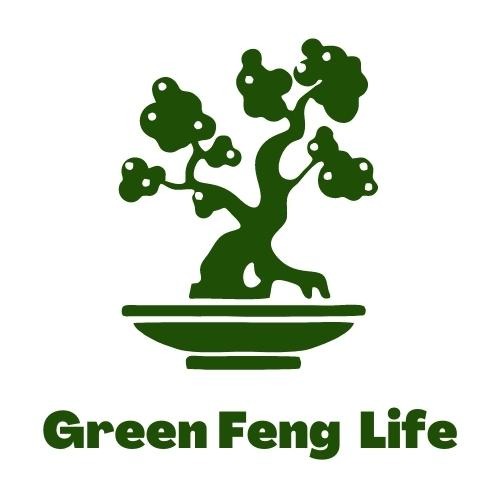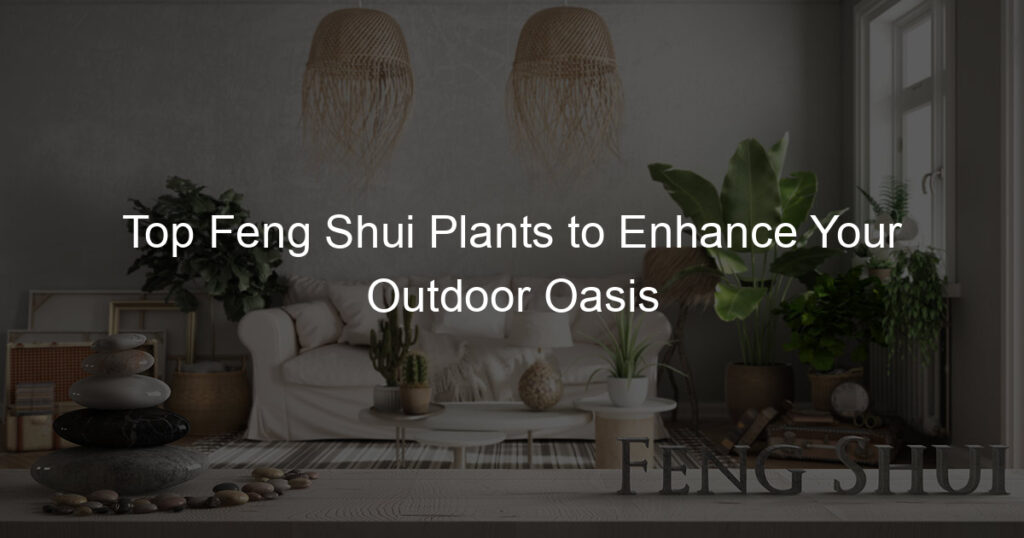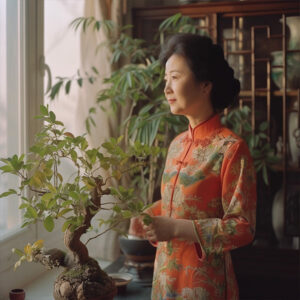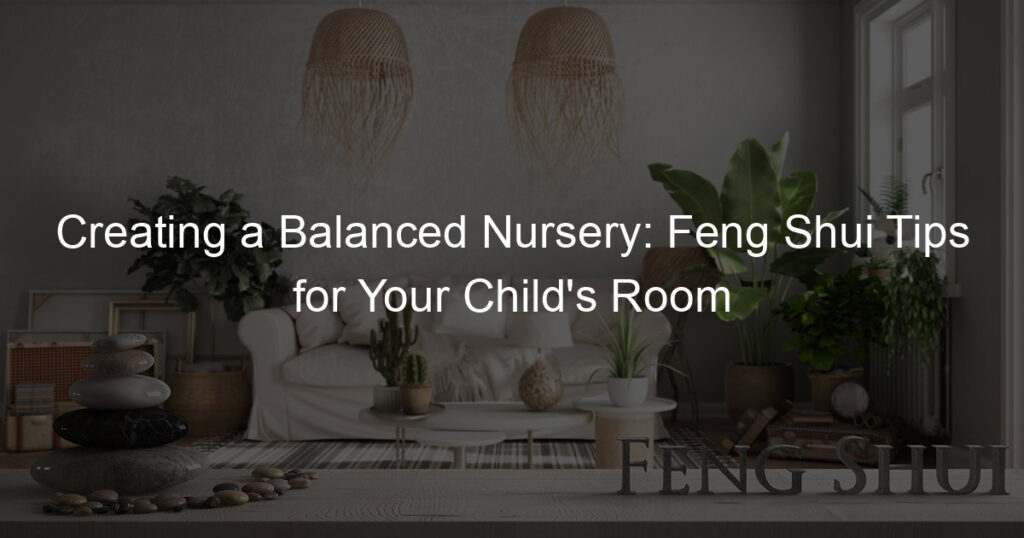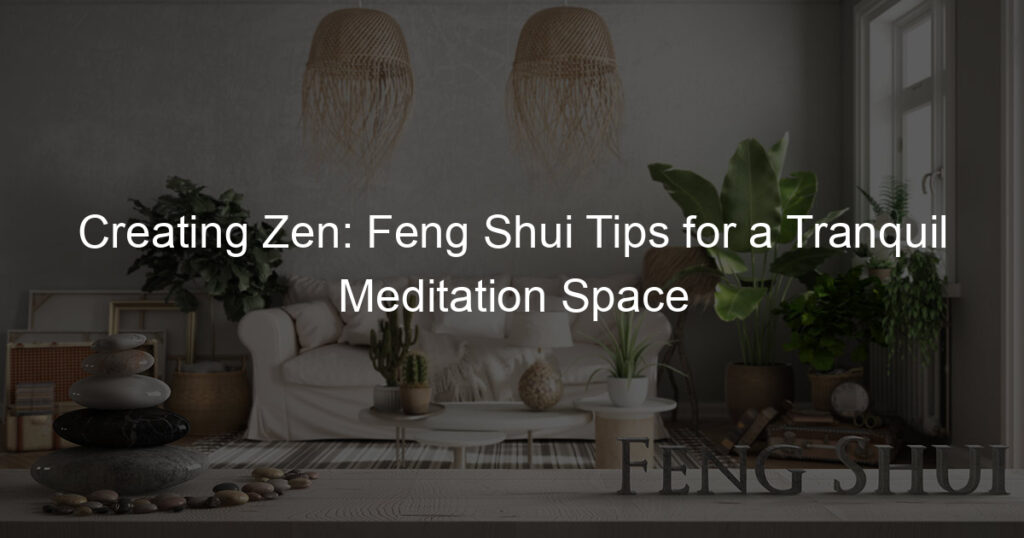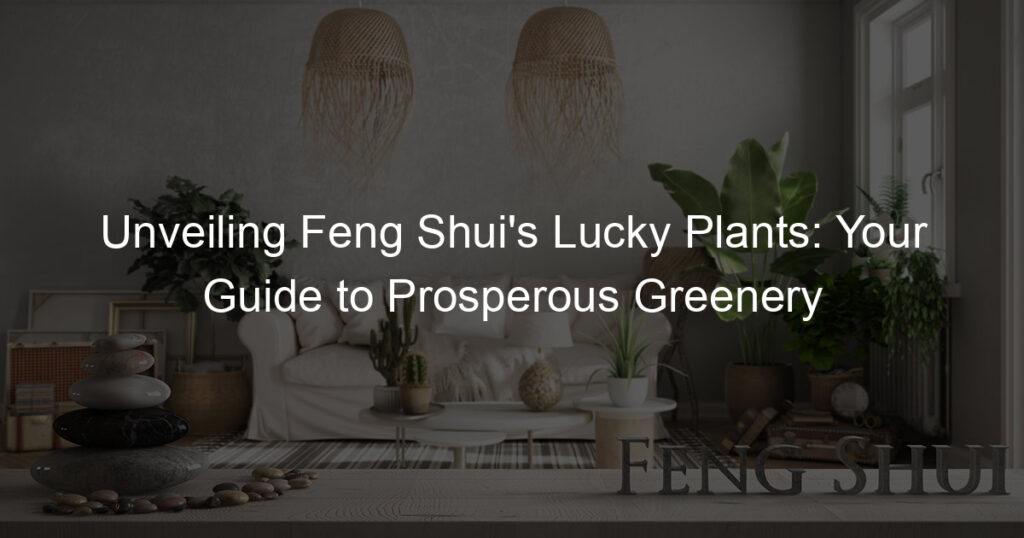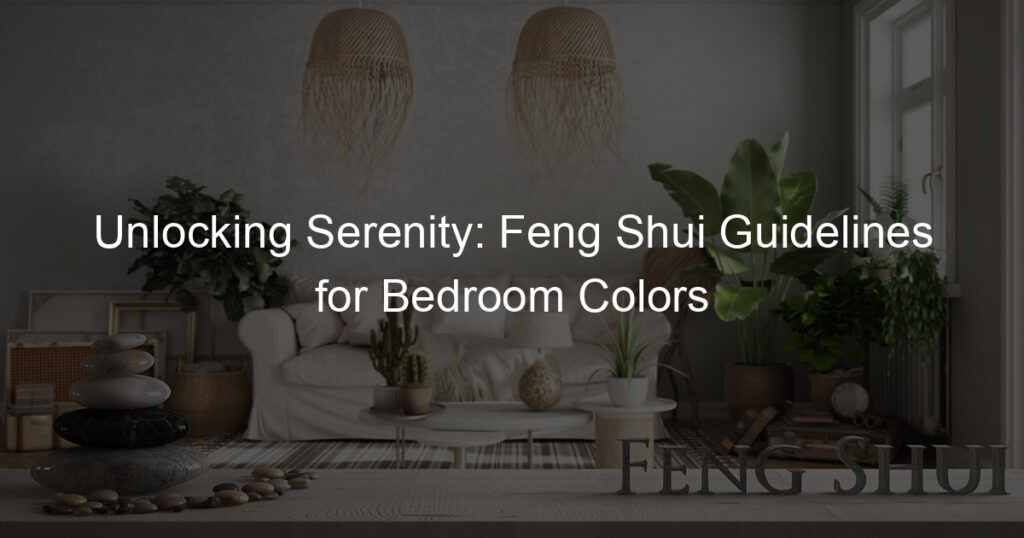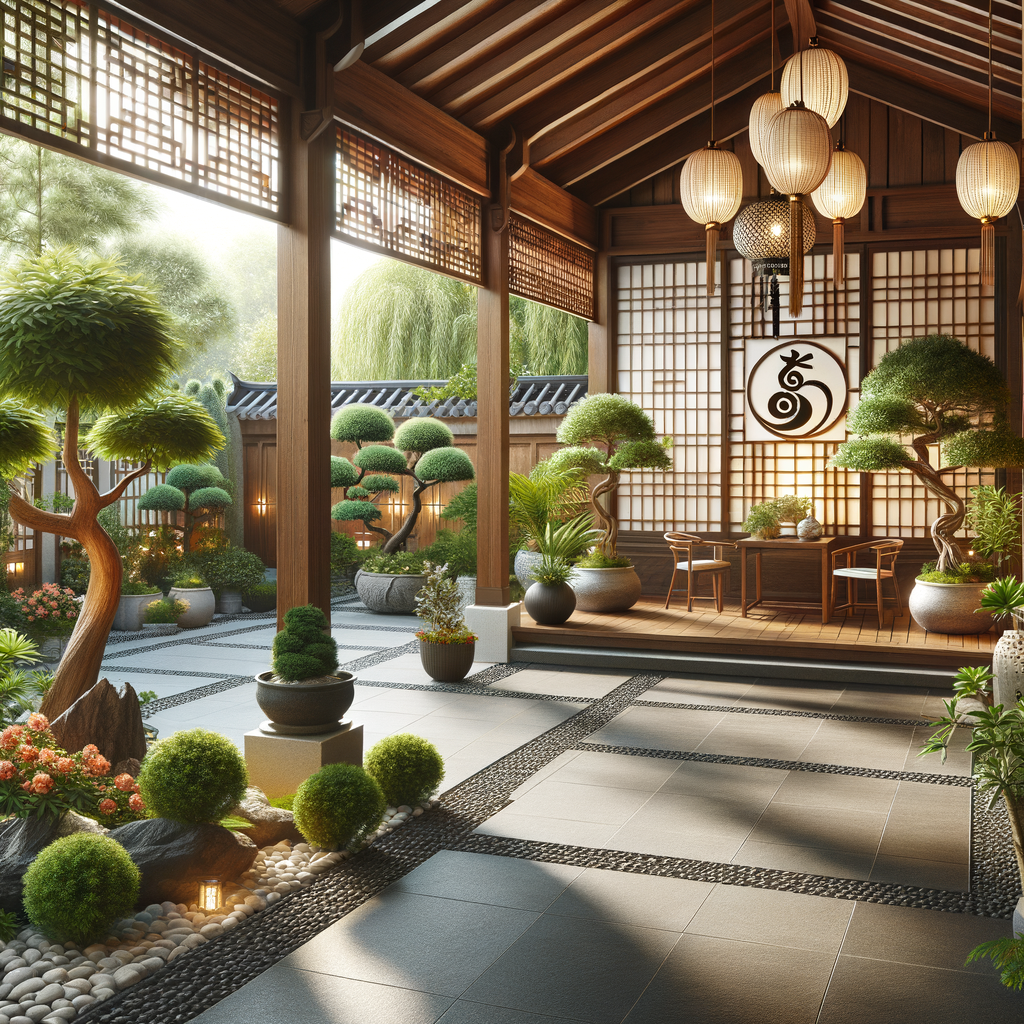
Introduction to Outdoor Feng Shui
Have you ever wondered how some outdoor spaces seem to have a certain calming energy, while others feel chaotic and uninviting? The answer could lie in the ancient Chinese practice known as Feng Shui. In this blog post, we will explore the concept of Feng Shui and its importance in outdoor spaces.
- Understanding the concept of Feng Shui
- Importance of Feng Shui in outdoor spaces
Feng Shui, pronounced as ‘fung shway’, is an ancient Chinese practice that aims to harmonize the energy, or ‘chi’, in a space. The term Feng Shui translates to ‘wind’ (Feng) and ‘water’ (Shui), two natural elements that flow and circulate everywhere on Earth. They symbolize the flow of life that one should aspire to have in their surroundings. This practice uses various tools and principles to balance this energy and create a positive environment.
Outdoor spaces are just as important as indoor spaces when it comes to Feng Shui. They are the first point of contact with the energy entering your home or office. A well-balanced outdoor space can attract positive energy, while a poorly arranged one can do the opposite. It’s not just about aesthetics; it’s about creating a harmonious environment that promotes well-being and prosperity.
By understanding and applying Feng Shui principles to your outdoor spaces, you can create a welcoming and peaceful environment. Whether it’s your garden, patio, or even your balcony, Feng Shui can help enhance the space and make it more enjoyable for you and your guests.
In the following sections, we will delve deeper into how you can apply Feng Shui to your outdoor spaces, including the best plants for your garden and tips for designing your outdoor oasis. So, stay tuned!
Best Feng Shui Plants for Your Garden
When it comes to creating a harmonious and positive energy flow in your garden, choosing the right plants is crucial. In the ancient Chinese practice of Feng Shui, certain plants are believed to bring good luck and prosperity. Let’s explore some of the best Feng Shui plants you can add to your garden for good luck.
Feng Shui Plants for Good Luck
Here are three Feng Shui plants that are known for attracting good luck and positive energy:
-
Jade Plant
The Jade Plant, also known as the ‘money plant’, is a popular Feng Shui plant known for attracting wealth and prosperity. Its round, coin-shaped leaves symbolize abundance. This plant is easy to care for, making it a perfect addition to your garden.
-
Lucky Bamboo
Lucky Bamboo is another plant that is often associated with good fortune in Feng Shui. It’s believed that the more stalks a Lucky Bamboo plant has, the more luck it brings. This plant is not only a symbol of good luck but also represents resilience and flexibility.
-
Money Tree
The Money Tree, with its unique braided trunk and lush, green leaves, is said to bring good luck and prosperity. It’s also known for its ability to purify the air, making it a healthy and lucky addition to your garden.
Adding these Feng Shui plants to your garden can help create a space that not only looks beautiful but also attracts positive energy and good luck. Remember, the key to good Feng Shui is balance, so consider the overall design and layout of your garden when adding these plants.
Feng Shui Plants for Patio
Creating a serene and harmonious patio environment can be achieved by selecting the right Feng Shui plants. These plants not only add beauty to your patio but also bring positive energy and balance. Here are three top Feng Shui plants that are perfect for your patio:
- Chrysanthemums
- Orchids
- Peonies
Chrysanthemums, often referred to as ‘mums’, are popular Feng Shui plants known for their vibrant colors and beautiful blooms. They symbolize longevity and joy in Feng Shui. Planting them in your patio can bring a sense of happiness and optimism to your outdoor space. They are also easy to care for, making them a great choice for beginners.
Orchids are another excellent choice for your patio. In Feng Shui, they are believed to enhance love and fertility. Their elegant and exotic appearance can add a touch of sophistication to your patio. Orchids require a bit more care than ‘mums’, but their stunning blooms are worth the effort.
Peonies are considered the ‘queen of flowers’ in Feng Shui and are associated with beauty and femininity. They can bring a romantic and tranquil atmosphere to your patio. Peonies thrive in sunny locations, so ensure they get plenty of sunlight on your patio.
Remember, the key to a harmonious patio is not just about the type of plants but also their placement. Consider the direction of sunlight, the size of your patio, and the color of your plants when arranging them. This will help create a balanced and positive energy flow in your patio space.
Feng Shui Landscaping: Designing Your Outdoor Oasis
Designing your outdoor space with Feng Shui principles can transform it into a serene oasis. Let’s explore how to create a balanced and harmonious Feng Shui garden.
Feng Shui Garden Design
When designing a Feng Shui garden, there are two key aspects to consider:
- Creating balance with the five elements
- Integrating Feng Shui plants in your garden design
Creating Balance with the Five Elements
In Feng Shui, the five elements – Wood, Fire, Earth, Metal, and Water – play a crucial role. They need to be balanced for a harmonious environment. Here’s how you can integrate them into your garden:
| Element | Representation | Ideas for Integration |
|---|---|---|
| Wood | Represents growth and vitality | Plant trees, add wooden furniture |
| Fire | Symbolizes passion and energy | Install a fire pit, use red flowers |
| Earth | Stands for stability and nourishment | Create a rock garden, use earth-toned pots |
| Metal | Signifies clarity and preciseness | Add a metal sculpture, use white flowers |
| Water | Represents wisdom and serenity | Install a water feature, like a pond or fountain |
Integrating Feng Shui Plants in Your Garden Design
Plants play a vital role in Feng Shui. They represent life, growth, and prosperity. But not all plants are equal in Feng Shui. Some plants, like the lucky bamboo or the peace lily, are considered more auspicious than others.
When integrating Feng Shui plants into your garden, consider their placement. For example, placing a plant representing the Wood element in the East sector of your garden can enhance health and family harmony. Similarly, a plant representing the Fire element in the South sector can boost recognition and fame.
Remember, the goal of a Feng Shui garden is to create a balanced and harmonious space where you can relax and rejuvenate. So, take your time, plan your design, and enjoy the process of creating your own outdoor oasis.
Feng Shui for Gardens: Case Study
Let’s delve into real-life examples of how Feng Shui principles can transform outdoor spaces. These case studies will provide practical insights into the application of Feng Shui in garden design.
-
Case Study 1: Transforming a Backyard with Feng Shui Principles
Our first case study involves a suburban home with a neglected backyard. The homeowner wanted to create a peaceful, harmonious space where they could relax and entertain guests.
The Feng Shui transformation began with a thorough cleaning and decluttering. The next step was to balance the five elements – wood, fire, earth, metal, and water. This was achieved by incorporating specific plants, a fire pit, stone sculptures, metal garden furniture, and a small water feature.
The result was a stunning transformation. The once chaotic backyard became a serene oasis, filled with vibrant plants and calming energy. The homeowner reported feeling more relaxed and at peace in their new Feng Shui garden.
-
Case Study 2: Patio Makeover with Feng Shui Plants
The second case study involves a small urban patio. The homeowner wanted to make the most of their limited outdoor space and create a relaxing retreat from the city’s hustle and bustle.
Feng Shui principles guided the selection of plants for the patio. The aim was to create a balance of yin and yang energies. This was achieved by mixing different types of plants – some with soft, rounded leaves (yin) and others with sharp, pointed leaves (yang).
The patio makeover was a success. The homeowner was delighted with their new outdoor space, which felt more balanced and harmonious. They reported feeling a sense of calm and tranquility every time they stepped onto their Feng Shui patio.
These case studies demonstrate the transformative power of Feng Shui in garden design. By applying these principles, you too can create a harmonious outdoor space that promotes relaxation and well-being.
Feng Shui Plants for Backyard: Creating a Harmonious Space
Creating a harmonious space in your backyard can be achieved by incorporating Feng Shui principles. This ancient Chinese practice is all about creating balance and harmony in your surroundings. One of the ways to achieve this is by choosing the right plants and arranging them optimally. Let’s delve into these two aspects.
- Choosing the right plants for your backyard
Choosing the right plants for your backyard is the first step in creating a Feng Shui-friendly space. Different plants have different energies, and it’s important to choose those that promote positivity and harmony. For instance, bamboo is considered a symbol of luck and prosperity in Feng Shui. It’s also easy to care for, making it a great choice for beginners.
Another good choice is the jade plant, which is believed to attract wealth. The round leaves of the jade plant symbolize coins, and it’s often placed near the entrance of the home to invite prosperity. Other Feng Shui-friendly plants include the peace lily, which purifies the air and promotes tranquility, and the rubber plant, which is known for its ability to remove toxins from the air.
- Arranging plants for optimal Feng Shui
Once you’ve chosen the right plants, the next step is to arrange them for optimal Feng Shui. The placement of plants can greatly affect the flow of energy in your backyard. For example, placing plants in the east sector of your yard is said to promote health and family harmony, while the southeast sector is associated with wealth and abundance.
It’s also important to consider the balance of yin and yang when arranging your plants. Yin and yang represent opposing but complementary forces, such as light and dark or soft and hard. To achieve this balance, you could pair plants with soft, rounded leaves (yin) with those that have sharp, pointed leaves (yang).
Remember, the key to Feng Shui is balance. So, avoid overcrowding your backyard with too many plants. Instead, aim for a harmonious blend of different plants that promote positive energy and create a peaceful, inviting space.
Conclusion: Enhancing Your Outdoor Space with Feng Shui
Creating a harmonious backyard with Feng Shui plants is not just about aesthetics. It’s about creating a space that promotes positivity, balance, and well-being. By choosing the right plants and arranging them optimally, you can transform your backyard into a tranquil oasis that not only looks good but also feels good.
Conclusion: Enhancing Your Outdoor Space with Feng Shui
As we draw to a close, let’s reflect on the key principles and practices that can help you create a harmonious and balanced outdoor space using Feng Shui. Whether you’re designing a garden, a backyard, or a small balcony, Feng Shui can be a powerful tool to enhance the energy flow and bring tranquility to your outdoor oasis.
- Key takeaways on using Feng Shui outdoor plants
- Choose plants with rounded leaves, as they are believed to bring good luck and wealth.
- Plants like bamboo and ferns are excellent for outdoor Feng Shui because they promote peace and tranquility.
- Avoid plants with thorns or sharp leaves, as they are thought to create negative energy.
- Position your plants thoughtfully. For example, placing a plant near the entrance of your home can invite positive energy.
- Final thoughts on creating a Feng Shui outdoor oasis
- Balance is key in Feng Shui. Try to balance the five elements – wood, fire, earth, metal, and water – in your outdoor space.
- Use natural materials whenever possible. They help to create a sense of calm and connection with nature.
- Keep your outdoor space clean and clutter-free. Clutter can block the flow of positive energy.
- Remember, Feng Shui is a personal journey. What works for one person may not work for another. Experiment with different arrangements and see what feels right for you.
Plants play a significant role in Feng Shui. They represent growth, prosperity, and positive energy. Here are some key insights:
Creating a Feng Shui outdoor space is more than just arranging plants and furniture. It’s about creating a harmonious environment that promotes well-being and relaxation. Here are some final thoughts:
In conclusion, Feng Shui offers a unique and holistic approach to enhancing your outdoor space. By following these principles, you can create a beautiful, balanced, and harmonious environment that not only looks good but also feels good. Happy Feng Shui-ing!
